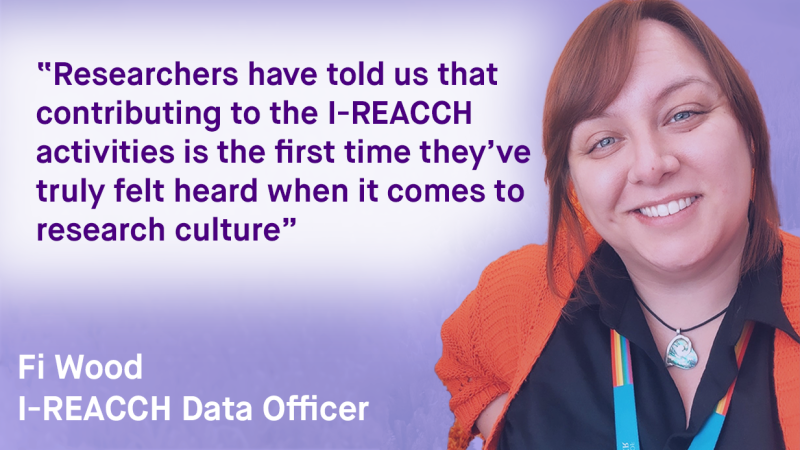How does I-REACCH support inclusive recruitment and career progression? Meet our Data Officer, Fi Wood!
Hi, I’m Fi, and I’m the Data Officer at I-REACCH. That means I support data management and governance across the project—making sure our data is well-organised, useful, and handled responsibly.
I-REACCH has five key workstreams, and I work across two of them: inclusive recruitment and career development. On the recruitment side, I help run workshops and interviews that explore how hiring practices affect diversity in research. I also collaborate with HR to analyse staff diversity data and track how things are evolving over time. In the career development stream, I’m part of the team building a user-friendly platform to support job planning and professional growth. It’s shaped by researchers themselves, so it’s designed to meet real needs.
Both streams aim to make academic research more inclusive, supportive, and sustainable—and it’s exciting to be part of something that’s driving real change.
Anything interesting or cool you want to share about your work?
What’s been really exciting is seeing the impact of co-design in action, both in my activities and across the other I-REACHH workstreams. Researchers have told us that contributing to the I-REACCH activities is the first time they’ve truly felt heard when it comes to research culture.
And in our recruitment work, we’re uncovering patterns and sparking conversations that are already shaping more inclusive hiring practices. It’s really nice to be part of something that’s not just talking about change—but actually making it happen.
How do you think your work is helping individuals at Leicester and beyond?
We’re creating practical tools and insights that people can actually use—whether that’s improving how we hire and support researchers, or helping them take clearer steps in their careers.
By grounding everything in real experiences and data, we’re making these systems more transparent and supportive. And while the work is based at Leicester, the aim is that it can inspire wider changes across the sector too.
What are the circumstances you face while working at I-REACCH that reflect on wider research culture?
One big theme we see is that support systems in academia do exist—but they’re often hard to access or don’t feel joined up. That shows up in both recruitment and career development.
But there’s also a lot of momentum for change. The openness from colleagues in sharing their experiences has been really powerful. It’s clear that people want a research culture that’s more inclusive, collaborative, and clearer about how it supports its researchers.

